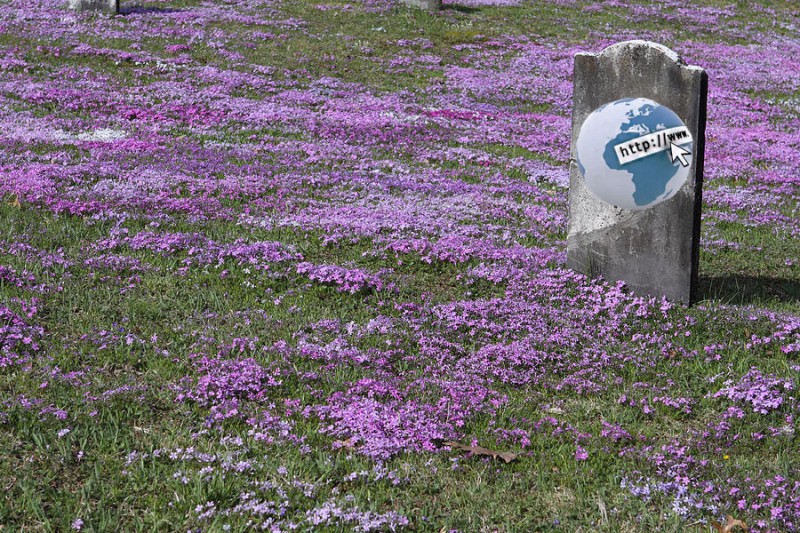
RIP RuNet. Images remixed by Kevin Rothrock.
The chickens of Russian Internet censorship are coming home to roost. Over the past year RuNet Echo has written extensively about the slow creep of legislation and regulation that could allow the Russian government to extrajudicially block any online resource through Russian ISPs. On March 13, 2014 the Russian Attorney General's Office requested [1] [ru] Roskomnadzor (Russia's mass media regulatory body) to include four websites in its registry of blocked websites, the so-called Internet “blacklist.”
Three of the blocked websites are the opposition news portals Kasparov.ru [2] (founded by Garry Kasparov), Grani.ru [3], and EJ.ru [4]. The reasons given are the following:
Указанные сайты содержат призывы к противоправной деятельности и участию в массовых мероприятиях, проводимых с нарушением установленного порядка.
The said websites contain calls to illegal activity and participation in mass events that are conducted contrary to the established order.
According to Kasparov.ru [5] [ru], the specific illegal activity probably relates to calls to attend “unauthorized protest actions.”
Also blocked was the personal blog of putative opposition leader Alexey Navalny, who is currently under house arrest for allegedly violating court orders (he is not supposed to leave Moscow while under investigation in an embezzlement case). Navalny's blog is updated by his wife for the duration of his sentence, even though he is supposed to be incommunicado during the house arrest period, or as Roskomnadzor put it:
Функционирование данной интернет-страницы нарушает положения судебного решения об избрании меры пресечения гражданину, в отношении которого возбуждено уголовное дело.
The functioning of this web page violates the provisions of a judicial decision about the measure of restraint for a citizen who is under criminal investigation.
Although the blocking has already started, the webpages do not yet appear in the Unified Registry [6] [ru] of blocked websites administered by Roskomnadzor. The first three media portals, however, appear in the unofficial list on Antizapret.info [7] [ru]:

The Registry of Blocked Websites. Screenshot. March 13, 2014.
Bloggers have started noticing the blockages. One of the first was the journalist Oleg Kashin, who asked [8][ru] his Facebook friends to let him know if they were having trouble accessing these websites. 100 peoples responded, offering screenshots and reporting which ISP they were using. For some of them, it seems that the blocking had yet to take place, most, however, were affected. Grani.ru also asked their readers to let them know what the blockage looks like from their side. Blogger Victor Korb responded with a screenshot:
@GraniTweet [9] pic.twitter.com/R6H6g3USLV [10]
— Victor Korb (@Victor_Korb) March 13, 2014 [11]
Navalny (or his wife) also posted [12][ru] about the news on his blog, ending with “I don't even know if anyone is reading this anymore.”
Kashin later wrote [13] [ru]:
Так завтра твиттер выключат и все. Что делать-то, ке фер?
So, tomorrow they'll turn off Twitter, and that that's it. What is there to do, que faire [“what to do” fr.]?
Earlier this week, on March 12, Tweet aggregator tjournal.ru reported [14][ru] that the pornography streaming website Pornhub was being blocked by Roskmonadzor.